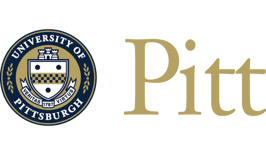

The inaugural Philips Grand Challenge produced a robust group of technologies in the sleep and respiratory care space from Pitt faculty and graduate students. After a full day of pitching, three winners were selected to share $100,000 in prize money, which will be used to further develop the ideas with the goal of licensing them out of the university where they can make an impact on people's lives.
See the prize winners and the finalists below.
Grand Prize Award Winner: $60,000
CAPS: Circadian Activity Profiling System for Age-Related Sleep Problems
Innovator: Stephen F. Smagula, PhD, Psychiatry, School of Medicine
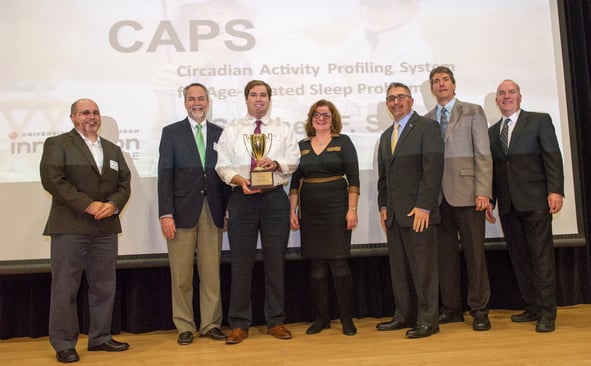
Poor sleep quality affects about half of older adults. Existing activity trackers estimate daytime activity and nighttime sleep separately and provide general recommendations on healthy levels of both. This approach misses the opportunity to measure an individual’s unique 24-hour rhythm, which is a profound determinant of sleep and overall health. Our Circadian Activity Profiling System (CAPS) provides users with personalized insights into how their daily rhythms impact sleep quality. Leveraging a large dataset from the University of Pittsburgh Sleep & Chronobiology Center, we derived and validated an algorithm that predicts sleep quality from a user’s activity profile. This algorithm forms the core of a mobile system that can help older adults understand and manage changes to sleep.
2ND AWARD: $30,000
BreathoMag: Biodegradable Nasal Stent for Snoring and Sleep Apnea
Innovators: Prashant Kumta, PhD; Puneeth Shridhar, MD MS, Engineering, Swanson School of Engineering
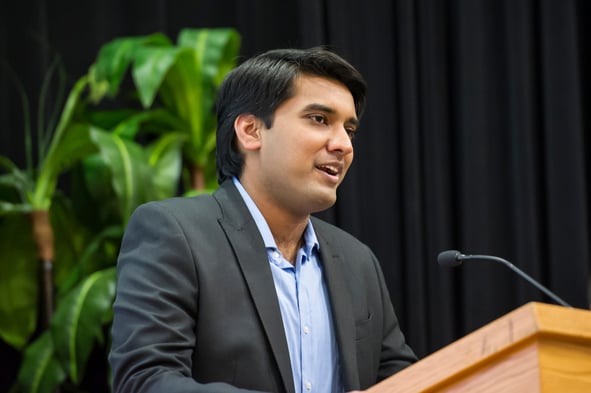
Sinus inflammation, a blocked nose, or a deviated septum can lead to snoring and sleep loss. Silicone and nitinol nasal stents address this problem by opening the nasal airway, but these devices can be uncomfortable and require periodic reinsertion. BreathoMag is a nasal stent composed of a novel magnesium alloy that comfortably opens the nasal passage and then slowly and safely absorbs into the body. Patients can place the stent themselves, making BreathoMag a user-friendly way for patients to sleep, breathe, and feel better.
AirPeace: Air Travel Comfort Mask for Humidity and Germ Control
Innovator: John Maier, MD PhD, Family Medicine, School of Medicine 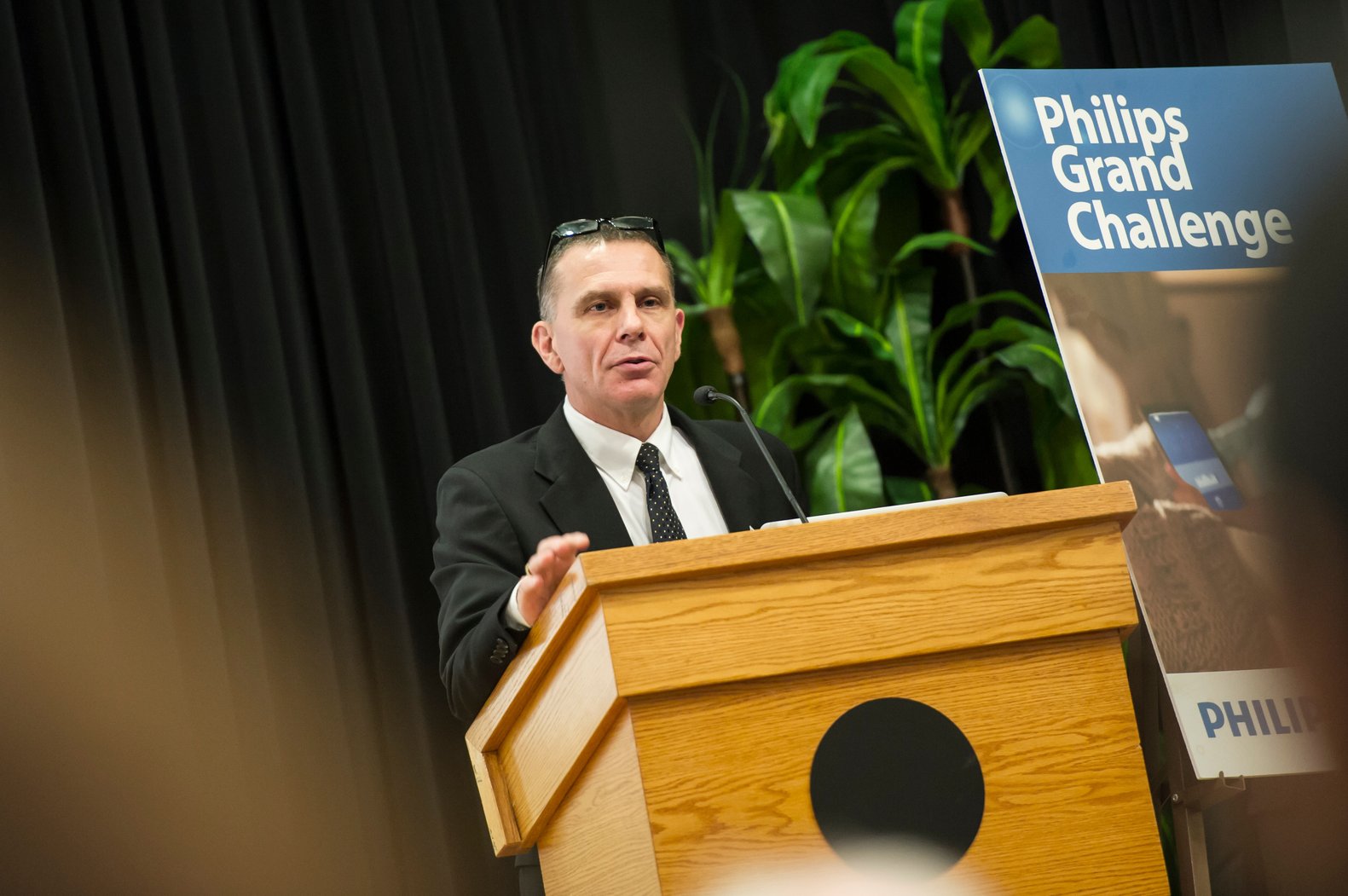
In the US alone, there are more than 2 billion airplane trips per year. When passengers spend a lot of time breathing dry, recirculated cabin air they can develop nose and throat irritation or contract airborne diseases. The AirPeace mask both retains humidity from the breath of the user and filters out microorganisms to provide the wearer with a more comfortable and germ-free travel experience. The mask can even be modified to deliver pleasant aromas or pharmaceutical interventions, such as a bronchodilator for treating restricted airways. For passengers who already have neck pillows, blackout masks, and noise cancelling headphones, AirPeace provides another mode of air travel comfort.
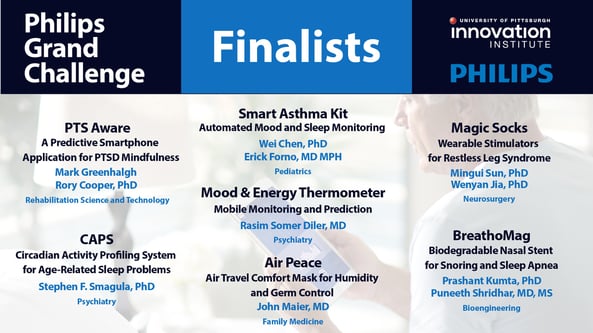
PTS Aware: Predictive Smartphone Application for PTSD Mindfulness
Innovators: Mark Greenhalgh; Rory Cooper, PhD
Annually, eight percent of Americans are diagnosed with Post Traumatic Stress Disorder (PTSD), in which environmental triggers cause physically and emotionally uncomfortable flashbacks and nightmares. Ongoing symptoms increase the risk of sleep disturbances, cardiovascular disease, substance abuse, and suicide, yet PTSD remains undertreated due to stigma and access. PTS Aware is the first mobile-based PTSD intervention that detects triggers before they can cause distress. A clinically-validated smartphone application uses machine learning to predict self-reported trigger contexts before a user enters those situations. For unreported triggers, sensors detect trigger-related patterns in the environment and physiology of the wearer. These predictive tools empower PTSD sufferers to minimize symptoms through increased situational awareness.
Mood & Energy Thermometer: Automated Mood and Sleep Monitoring
Innovator: Rasim Somer Diler, MD
Despite increased attention to mood swings, current diagnostic systems still rely on questionnaires rather than objective metrics. Memory bias and conflicting reports from patients and their families often result in the wrong diagnosis and contraindicated interventions. Commercial apps today can track mood and motion, but none have a scientific way to integrate them. Our novel Mood & Energy Thermometer (MET) tool links subjective mood monitoring variables with objective activity and sleep metrics. The MET tool uses a machine learning algorithm trained on an inpatient mood and activity dataset to quickly and automatically catch the next mood swing early, when it is most easily mitigated.
Smart Asthma Kit: Mobile Monitoring and Prediction
Innovator: Wei Chen, PhD; Erick Forno, MD MPH
Asthma is a major public health problem that affects 26 million people in the US, including 7 million children, and costing over $56 billion per year. Asthma exacerbations account for more than half of the total childhood asthma cost in the US, and currently there is no widely-used system to accurately predict them. Our asthma exacerbation risk assessment algorithm will run on a smartphone mobile application to help monitor and manage childhood asthma exacerbations on a daily basis. Using real-time activity data and artificial intelligence, the app will predict the onset of an asthma exacerbation episode and alert the user so that they may prevent symptoms from worsening. This app could enable real-time management for mild to moderate asthma as well as chronic obstructive pulmonary disease.
Magic Socks: Wearable Stimulators for Restless Leg Syndrome
Innovators: Mingui Sun, PhD; Wenyan Jia, PhD
Restless Leg Syndrome (RLS) is one of the most common movement disorders, and it can significantly impact sleep. In the US, more than 25 percent of those over age 65 experience RLS. Although drugs can relieve RLS symptoms, they carry significant side effects. Magic Socks are a wearable textile device that provides non-pharmacological relief from RLS by mechanically or electrically stimulating the lower extremities. During the day, patients can manually activate their Magic Socks whenever they feel discomfort in their feet or legs. At night, motion sensors within Magic Socks can detect abnormal leg movements and trigger an appropriate level of stimulation without waking up the patient.
Add to Calendar
about the Philips Grand Challenge
The Philips Grand Challenge enhances opportunities for innovations developed at the University of Pittsburgh in areas of interest to Philips to advance towards commercialization. The Challenge, is intended to provide financial support that cannot typically be obtained from other traditional sources of funding (including the faculty member’s department/school or external government funding agencies).
3 Awards will be given to Pitt faculty to advance their latest technology in the sleep or respiratory area:
